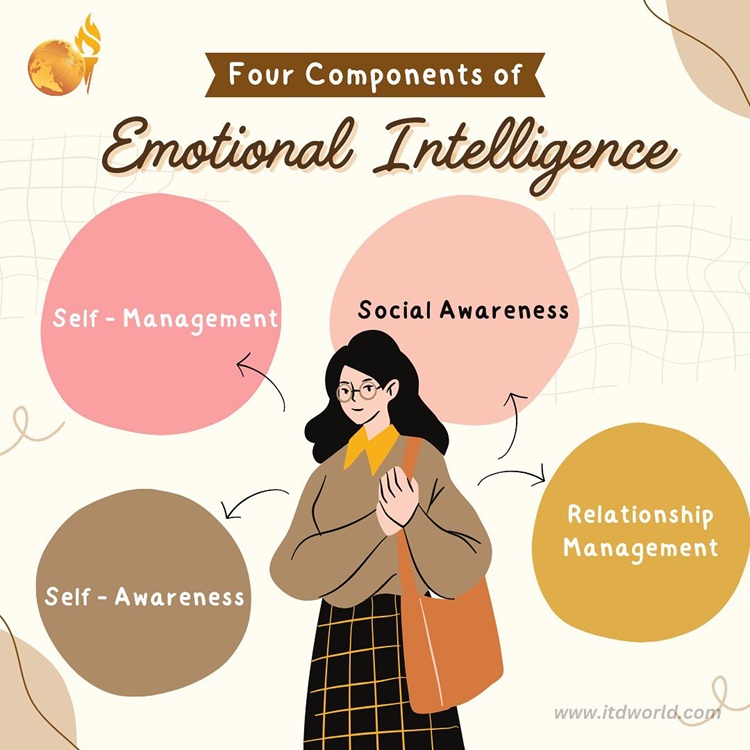Discover the power of emotional intelligence (EQ), plus how to harness it to inspire, motivate, and lead with empathy and authenticity!
Emotional intelligence is a critical component of both effective management and personal development. Those who possess high EQs are better equipped to understand, connect with, and inspire others – which all contribute to their long-term professional success. In this article, we will explore the concept of emotional intelligence, its impact on leadership, plus strategies for strengthening and utilizing this crucial soft skill.
(by Jonathan M. Pham)
Highlights
- Emotional intelligence (EQ) is the ability to understand and manage one’s own and others’ emotions. It encompasses qualities such as self-awareness, self-regulation, empathy, and relationship management, leading to positive interpersonal interactions.
- The study of EQ evolved from early concepts like social intelligence in the 1930s to its formal definition by Salovey and Mayer in 1990 and widespread popularization by Goleman in 1995.
- A crucial requirement for success, high EQ fosters strong relationships, manages stress, boosts productivity, and enables effective leadership by understanding and responding to people’s emotions.
- Emotional intelligence can be improved through self-reflection, seeking feedback, developing self-regulation, and working with experts. For those in management positions, they need to focus on building relationships, appreciating contributions, investing in learning, and mastering conflict resolution.
What Is Emotional Intelligence?
Emotional intelligence or quotient (also referred to as EI/ EQ) refers to the ability to recognize, understand, and manage the emotions of oneself and others around them. It is the combination of various qualities, including self-awareness, self-regulation, empathy, and relationship management.
People with high EQs are characterized by the ability to establish – as well as nurture – positive interaction with those around them. Not only capable of realizing and reasonating with other’s feelings, they are also quite adept at controlling theirs. Their mastery of verbal and non-verbal cues makes them revered experts in communication and interpersonal interaction.

History of Emotional Intelligence Study
Emotional intelligence is a topic that has swiftly captured widespread attention since its first inception. The history of research into this subject is marked by some of the following major milestones:
- In the 1930s, psychologist Edward Thorndike introduced the notion of “social intelligence,” emphasizing the significance of interpersonal adeptness.
- In the 1940s, psychologist David Wechsler proposed the idea that various facets of intelligence could significantly impact life success.
- During the 1950s, the Humanistic psychology movement – led by influential thinkers like Abraham Maslow – embarked on studying the diverse pathways to emotional empowerment.
- A pivotal breakthrough arrived in the mid-1970s with the introduction of the concept of multiple intelligences. Howard Gardner challenged the notion of intelligence as a singular construct, advocating instead for a tapestry of distinct capacities.
- The term “emotional intelligence” itself made its debut in 1985, within Wayne Payne’s doctoral thesis. Shortly thereafter, Keith Beasley mentioned the term “emotional quotient” in an article published in Mensa Magazine (1987).
- A seminal moment transpired in 1990 – when psychologists Peter Salovey and John Mayer published the groundbreaking paper “Emotional Intelligence” in the journal Imagination, Cognition, and Personality. They defined emotional intelligence as “the ability to perceive and understand one’s own and others’ emotions, distinguish among these emotions, and use this information to guide one’s thinking and actions.”
- In 1995, the concept of emotional intelligence gained significant popularity with the publication of Daniel Goleman’s influential book “Emotional Intelligence: Why It Can Matter More Than IQ“.
Since Goleman’s pivotal research, the topic has continued to captivate the public’s imagination, extending its influence beyond the realm of psychology to fields such as education and business.

Daniel Goleman, a leading pioneer in the study of EQ
Signs Of Emotional Intelligence
- Emotional mastery. Emotionally intelligent people can identify and acknowledge their feelings, whether positive or negative, and are able to regulate and control them in a healthy and constructive manner. Instead of reacting impulsively in stressful situations, they remain calm and composed, striving to make thoughtful decisions.
- Empathy and sensitivity. By putting themselves in the shoes of others, they are capable of reasonating with people’s feelings and perspectives – which allows them to respond with sensitivity and compassion, providing support and guidance when needed.
- Adaptability. Their ability to regulate their own impulses, maintain a level-headed approach, and flexibly adapt to changing circumstances allows them to think rationally and come up with innovative solutions.
- Focus on authentic interpersonal interaction. Those with high EQs prioritize the development of strong trust-based relationships with others. They treat others with respect and fairness, creating a supportive and harmonious environment. As conflicts arise, they listen to all parties involved to seek common ground and find win-win solutions.
Why Emotional Intelligence Matters
There is perhaps no psychological skill more fundamental than resisting impulse.
In the pursuit of success, it is often asserted that emotional intelligence (EQ) outweighs intellectual quotient (IQ) – and for good reasons. High EQ plays a major role in facilitating collaboration, elevating job satisfaction, and improving overall professional performance. Mastery of this soft skill is a fundamental prerequisite for navigating intricate social dynamics, making informed decisions, and exerting a positive influence on others.
Reasons why emotional intelligence holds such importance:
- Cultivating better relationships: High EQ enables us to comprehend and respond to the emotions of others, forming the bedrock of strong, meaningful relationships. By exhibiting qualities such as active listening, empathy, and supportiveness, we are better equipped to establish trust and rapport with others.
- Managing stress and enhancing mental health: While stress is a universal experience, those with high EQs are adept at managing it, preventing it from overwhelming them. Even in challenging circumstances, they remain composed and capable of making sound decisions. This not only allows them to better overcome difficulties, but also helps improve overall well-being and mental health.
- Boosting productivity: EQ is a major contributor to enhanced problem-solving and productivity in both personal and professional spheres. The ability to effectively manage one’s feelings promotes focus and motivation – while at the same time reducing the likelihood of errors and procrastination.
- Exercising effective leadership: Emotional intelligence is an indispensable trait for effective leadership. Leaders with high EQ possess the ability to inspire and motivate others, establish trust, and resolve conflicts. Furthermore, they excel at discerning the emotional states of their team members, enabling them to adapt their leadership style accordingly. This translates to improved communication, engagement and satisfaction in the workplace.
Emotional self-control – delaying gratification and stifling impulsiveness – underlies accomplishment of every sort.
Daniel Goleman

How Emotional Intelligence Promotes Effective Leadership
Leadership is not domination, but the art of persuading people to work toward a common goal.
Daniel Goleman
When envisioning an exemplary leader, what qualities immediately spring to your mind?
Perhaps you are likely to imagine one who exudes unruffled composure, maintaining an unshakeable demeanor regardless of the challenges at hand. Such a leader is characterized by their affable nature, fostering trust among their team members and valuing their perspectives. Every decision they make is preceded by meticulous evaluation and open dialogue. In essence, they epitomize leadership guided by emotional intelligence.
EQ serves as a cornerstone of effective managerial leadership – by helping with:
- Building trust: Leaders who understand and connect with their team members on an emotional level are capable of establishing trust and open communication internally. This encourages people to feel comfortable sharing ideas, concerns, and feedback – leading to stronger collaboration and a sense of psychological safety within the organization.
- Influencing others: The ability to address individual and collective emotional states allows leaders to tailor their communication style – so that team members are inspired by their visions and goals, as well as able to realize and unlock their full potential.
- Conflict resolution: With emotional intelligence, managers are better equipped to approach disagreements with a calm and rational mindset, be ready to actively listening to all parties involved, and find common ground among them.
- Decision making: By taking into account the emotional climate and considering the perspectives of others, leaders may come up with resolutions that are well-received and embraced by the team.
The 4 Components Of Emotional Intelligence
-
Self-awareness
People with self-awareness recognize their own emotions and their cause – they also understand how anger or excitement impacts the decision-making process, which allows them to make conscious choices and respond effectively in varying situations.
Data from a research by organizational psychologist Tasha Eurich highlight that although 95% people believe that they are self-aware, only 10-15% actually are. As the majority of us have a wrong perception about ourselves, it is hard for us to be conscious of our own emotions and resonate with others’ feelings.
-
Self-management
While self-awareness means mastery of one’s feelings, self-management refers to the ability to regulate them. Those with such a quality frequently display skillfulness in handling stressful situations and maintaining a positive attitude under all circumstances.
-
Social awareness
Aside from understanding and controlling their own emotions, people with high EQs are also adept at discerning the feelings of others and the organizational dynamics at work – which is commonly referred to as “social awareness”. They constantly make an effort to comprehend the thoughts and viewpoints of others – this allows them to establish meaningful, authentic relationships, as well as foster a sense of belonging within their circles.
-
Relationship management
Relationship management involves the ability to communicate, persuade, coach, mentor, and successfully resolve conflicts with/ among others. Those with refined emotinal intelligence are known for continously working to build and maintain positive connections with others – additionally, they are not afraid to confront disagreements and handle problems. Their presence plays a major role in fostering a harmonious and productive work environment.
Read more: Executive Presence – Key Strategies for Professional Success

How To Measure Your Emotional Quotient (EQ)
Discovering your emotional quotient is an essential step toward personal growth and improved interpersonal dynamics. To assist you in this journey, we present the LEONARD Personality Inventory (LPI) application – meticulously crafted by esteemed researcher Dr. Leonard Yong. By leveraging the power of his assessment tool, you may gain invaluable insights into your behavioral preferences and unveil your unique personality type.
Dr. Yong has distilled his extensive research into four distinct personality types, and the LPI app will provide you with a comprehensive analysis of your position within this framework. Armed with this knowledge, you can devise a tailored plan for personal development and optimize your effectiveness within team environments.
Experience the transformative benefits of assessing your emotional intelligence with Dr. Yong’s EQ test. To embark on this enlightening journey, simply download the LPI app below and embark on a voyage of self-discovery!
How to Improve Emotional Intelligence
-
Engage in self-reflection and self-awareness exercises
Taking time for self-reflection allows you to gain a deeper comprehension of your own emotions, triggers, and patterns of behavior. Journaling or practicing meditation are just a few among the various amazing methods of establishing self-awareness – the foundation of emotional intelligence. These two activities help slow down your train of thoughts – so that you may reflect on your reactions in certain situations, and explore ways to improve the responses.
-
Seek feedback from others
Soliciting feedback from colleagues, team members, and even mentors should provide invaluable insights into one’s own blind spots. During this process, one must be willing to give full attention to other’s opinions and suspend his/her habit of passing judgment. By opening yourself to constructive criticisms, you are better equipped to identify areas where you can work on for improvement.
For instance, a sales executive – who always receives complaints from customers – may ask for feedback on his communication style. After several talks with the line manager and colleagues, it turns out that he always appears to be aggressive when trying to persuade clients to take action. This discovery serves as the foundation for him to later improve his interpersonal interaction and better handle disagreements.
-
Develop self-regulation
One may hone their self-regulation capability by utilizing stress management techniques, such as deep breathing exercises and taking breaks to recharge. If possible, consider practicing mindfulness, which is essential to staying present and calm under all circumstances.
Adopting healthy coping mechanisms – such as exercises or engaging in hobbies – provides a great way to support emotional well-being and enhance self-management skills.
Read more: Self Leadership – The Art of Leading from Within
-
Work with experts
Emotional intelligence can be developed and improved with the help of an expert in the field. For example, one may consider participating in training workshops that discuss topics related to EQ – or enrolling for one-on-one coaching sessions to receive personalized guidance and support.
Read more: 50 Essential Emotional Intelligence Quotes for Success
Tips for Leading With Emotional Intelligence
Leading with emotional intelligence requires continuous effort and self-reflection. By implementing the tips below, one should be better equipped to enhance their leadership effectiveness, inspire others, and build up an environment that fosters growth, productivity, and overall success.
- Focus on relationship building. As a leader, your job is to cultivate relationships based on trust, respect, and authenticity with your team members. Be reliable and transparent in your communication, follow through on commitments, and treat everyone with fairness and dignity. Encourage open dialogue, provide support, and value diverse perspectives.
- Appreciate the contributions of others. A culture of appreciation boosts morale, motivation, and loyalty. For this reason, make sure to recognize your team members’ efforts and achievements – whether big or small – and provide regular feedback whenever possible. Create opportunities for growth and development, and empower your team members to take on challenges and stretch their skills.
- Invest in learning and development. A commitment to ongoing learning and development is essential for an organization’s sustainable growth. Stay abreast of industry trends, seek out relevant training opportunities, and encourage your team members to engage in continuous growth. Foster a culture of curiosity and intellectual agility, and provide the necessary resources to facilitate learning and skill enhancement.
- Master conflict resolution skills. Disagreement is inevitable in any workplace setting. A leader’s role is to encourage open and constructive dialogue when conflicts arise, allowing all parties to express their perspectives. Act as a mediator, actively listening to each side, seek common ground, and strive for a win-win resolution that addresses the underlying issues/ concerns of everyone.
Every unaddressed conflict wastes about eight hours of company time in gossip and other unproductive activities.

Final Thoughts
Emotional intelligence (EQ) stands as a powerful asset for those seeking to create meaningful impact and cultivate thriving environments. By embracing the strategies discussed above, leaders should be better equipped to pave the way for enhanced collaboration, productivity, and overall success.
Other resources you might be interested in:
- 8 Effective Coaching Skills for Leaders & Managers
- EQ in the AI Age: Why It Matters for Leaders
- Human Leadership in a Digital World: Skills & Strategies
- Future Ready Organization: 11 Tips to Building One
- Moving From the Golden Rule to the Platinum Rule: Leading with Empathy and Understanding

